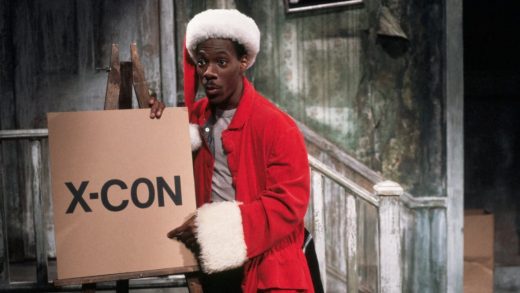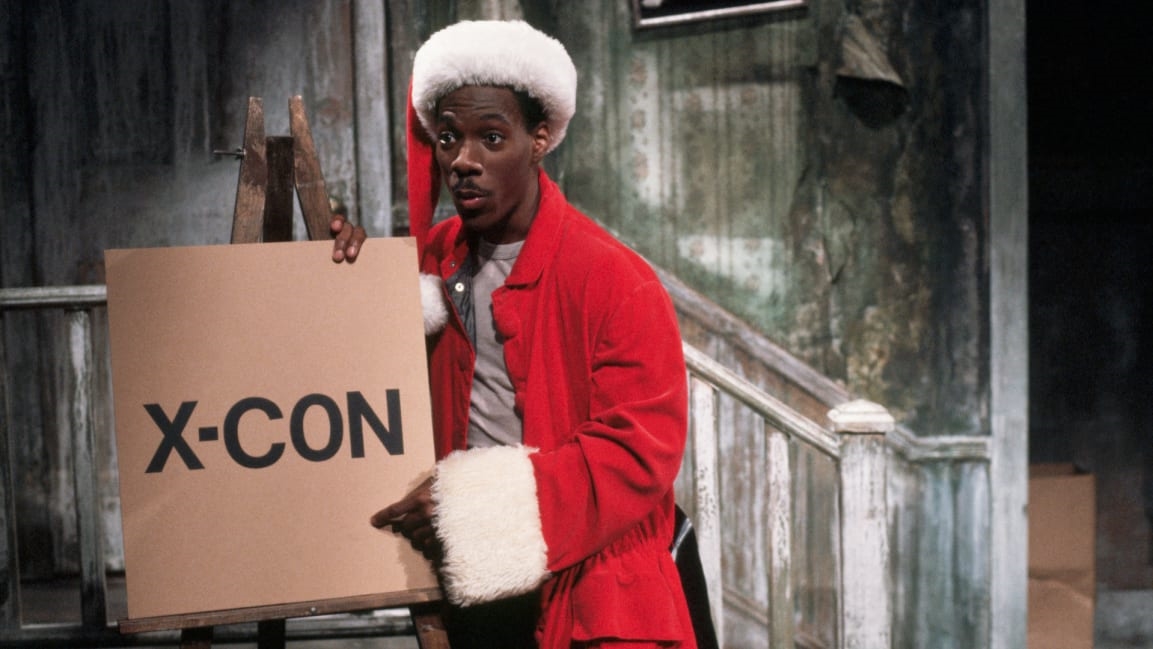He’s Eddie Murphy, dammit, and he saved this damn ‘SNL’ from the gutter—again
Eddie Murphy returned as host of Saturday Night Live for the first time in 35 years for the last show of 2019, and as with his exuberant turn in the Netflix movie Dolemite Is My Name, he remains as dynamic and magnetic a performer as when he burst on the scene almost 40 years ago.
If you ever loved Murphy, then it remains good to have him back, and this episode of SNL will generally make you feel warm and happy, even if it never quite reaches the comedic or emotional heights of Adam Sandler’s return last spring.
After not appearing in the interminably long and unfunny cold open about the last Democratic presidential debate, Murphy came out to Studio 8H rather muted, beaming with magnanimity over the place that made him a star. I predicted coming into the show that Murphy would either do a set of jokes, giving people a taste of his reported return to standup, or there would be some bit where cast members would come out and tell him what he meant to them. Murphy got off one good bit about how he’s a stay-at-home dad with 10 kids and “America’s Dad” Bill Cosby is in jail, but SNL gonna SNL and the monologue quickly became an excuse to fill the stage with guest stars.
It was definitely a cool moment to create a Mount Rushmore of black comedy live on stage, uniting Murphy with Tracy Morgan and Chris Rock, two African American standups who were hired to join the SNL cast in the effort to recreate the magic Murphy created, and Dave Chappelle, whose connection to the show is that he hosted once in 2016.
But the idea was kind of muddled, too. Either bring together every “next Eddie Murphy” from the show’s shameful history of rarely having more than one black performer (Damon Wayans and Jay Pharaoh should have been there), or assemble every black comedy megastar of the last 40 years whom Murphy paved the way for: Kevin Hart (who did get name-checked as Murphy’s eleventh child), Katt Williams, Tiffany Haddish, and so forth.
Anyone with even the loosest sense of how SNL works and Eddie Murphy’s body of work from his time on the show knew that “Mister Robinson’s Neighborhood” was coming back, and it was the best sketch of the night. The Mister Rogers parody arguably had as much or even more bite in 2019 than ever before, with Robinson’s neighborhood having gentrified and him now dealing with young white couples who bought million-dollar apartments in his tenement building. Like almost every SNL sketch, it falls apart at the end, resorting to old tropes, but for the first few minutes it cooks.
Much of Murphy’s success on SNL in the early 1980s came from his clever reinvention of the TV he—and the generation watching at that time, me included—grew up consuming after school. There were only a handful of channels and they were packed with time-filling nonsense like the claymation series Gumby and The Little Rascals, whose one black character, Buckwheat, was a racist stereotype. This kind of TV flotsam comprised the shared language of any kid who watched too much TV, and Murphy brilliantly transformed them into comedic gold by turning Gumby into a foul-mouthed old showbiz New Yorker and Buckwheat into a musical icon even if he was unintelligible.
I guess it’s fan service to bring back Murphy’s greatest hits (as well as yet another sign of SNL‘s general creative bankruptcy), even though you really have to be at least 45 years old to have any sense of either Murphy’s original bits or the references. The Gumby segment—where Murphy dresses down Che and Jost at the Weekend Update desk—works better than Buckwheat on The Masked Singer, because it’s always fun to see Che and Jost get insulted, especially by a screaming man in a large green foam suit. You don’t really need any context to enjoy it.
But both sketches—as well as the return of Murphy’s pimp Velvet Jones, shoehorned into a Black Jeopardy sketch—have to bend over backward to acknowledge the dissonance between a character that made sense in the early 1980s but no longer does so today. They do so with varying degrees of success. I cannot imagine what an 11-year old staying up late to watch SNL would make of Buckwheat or Jones.
Murphy, though, powers through with his sparkle and energy, doing what he’s done so many times in his career: transcend mediocre to bad material. He’s having fun, breaking character and laughing a couple of times, inadvertently saying “shit” and then charmingly covering his mouth during a mostly bad baking-show sketch, and elevating what he had to work with.
As he says as Gumby, “I saved this damn show from the gutter . . . and this is the thanks I get?”
Yes, 1,000 times yes, thank you. Good to have Murphy back.
(56)



